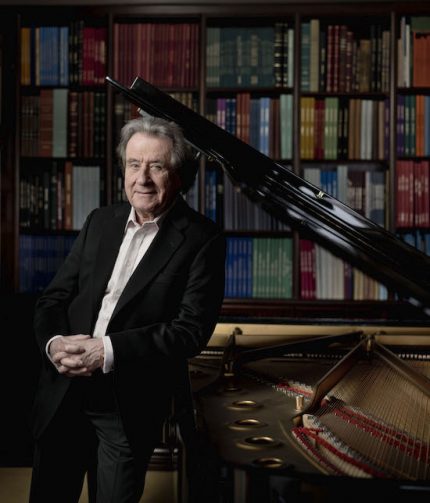Buchbinder’s “Appassionata” highlights round two of Beethoven sonata series

On Wednesday night Rudolf Buchbinder offered the second installment of Symphony Center Presents’ yearlong presentation of the complete Beethoven piano sonatas at Orchestra Hall. The first of two programs the Austrian pianist is performing in a week, Wednesday’s recital comprised four sonatas of Beethoven’s early and middle periods. The event recouped from an indifferent opening to make for an overall exceptional evening.
Beethoven’s first published piano sonatas appeared in a set of three as his Op. 2 in 1796. The first half of Buchbinder’s program was devoted to the first and third of these, in F Minor and C Major, respectively. A striking element of these early forays is the thinness of their melodic material. Themes here are often little more than an elaborated scale or arpeggio, and in Beethoven’s ingenious treatments one can perceive him developing as the nonpareil composer of tension and movement.
This was evident in Buchbinder’s readings of the two works, though with greater dividends as the program progressed. Sonata No. 1’s opening theme is a simple rising chord, but Buchbinder leant it an angularity that felt as though it foreshadowed the composer’s later development. There is more poetry in the ensuing Adagio than Buchbinder mined, though its lyricism nonetheless contrasted amply with the opening movement’s austerity. The Menuetto felt anemic, though Buchbinder rendered in major key trio in characterful fashion, and the headlong finale was articulate but lacking in impact.
Buchbinder was apparently playing himself into form, as there were no qualms to be had about the remainder of the performance. The Austrian thoughtfully charted the expansive opening movement of Sonata No. 3, always conveying a sense of trajectory in the extravagant wanderings between each return of the hesitant first theme. Buchbinder captured both the fragility and anguish of the Adagio, and the Scherzo was genuinely playful in his hands. The final Allegro assai went off in brisk and quicksilver fashion, Buchbinder nimbly propelling its rising and falling figurations.
One could see why Beethoven was less than pleased that his brother Karl submitted the two sonatas we know misleadingly as Op. 49 for publication in 1805. These are study works, and indeed the composer referred to them as “Easy Sonatas,” probably written in the late 1790’s for aristocratic patrons or pupils.
These do not sound as though they came from the man who one year earlier had written the Eroica Symphony; indeed, Sonata No. 20 in G Major sounds like particularly well-crafted Clementi, complete with a second movement grounded by an Alberti bass. Buchbinder’s rendition had ample proportion and grace, but given the fireworks that were to follow, Sonata No. 20 felt like a warm up jog before a race.
The program closed with the eternal Sonata No. 23 in F Minor, “Appassionata,” and here Buchbinder was inspired. From the murky opening of the Allegro assai, he deployed this forceful music with immense impact and effortless power. The ever-circling material had an insistent, obsessive quality, and the clouds did not lift even for the lilting second theme in major.
The central Andante con moto serves a similar function as the slow movement to the contemporaneous Violin Concerto (played by Leonidas Kavakos with CSO this past week): a static respite between complex, active movements. Buchbinder leant it great delicacy, before launching attacca into the finale. This closing movement was unrelenting, Buchbinder driving it to a thrilling, clangorous conclusion.
As an encore he offered the last movement of the Sonata No. 8 in C Minor, “Pathétique.” One could question the wisdom following the end of the “Appassionata” with another last movement, and also taking a chronological step backward in an otherwise forward marching program. But Buchbinder’s agile, incisive reading more than compensated for any such quibbles, and sent the audience out into the evening sated.
Rudolf Buchbinder continues Symphony Center’s cycle of Beethoven sonatas 3 p.m. Sunday, performing the complete Op. 10 (Sonatas Nos. 5-7), and Sonata No. 18 in E-flat Major. cso.org
Posted in Performances

